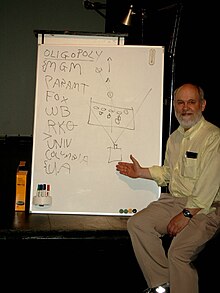דייוויד בורדוול
 | |
| בורדוול ב-2007 | |
| שם לידה | David Jay Bordwell |
|---|---|
דייוויד ג'יי בורדוול (באנגלית; David Jay Bordwell; 23 ביולי 1947 - 29 בפברואר 2024) היה תאורטיקן אמריקאי והיסטוריון של הקולנוע.[1] לאורך מרבית הקריירה שלו הוא שימש פרופסור לקולנוע באוניברסיטת ויסקונסין-מדיסון, ולאחר מכן היה פרופסור במחלקה לאמנויות תקשורת. הוא נודע כנציג הגישה הקוגניטיבית והנאו-פורמליזם בקולנוע.
הגות וקריירה
ב-1974 הוא קיבל דוקטורט מאוניברסיטת איווה. בהגותו, בורדוול שאב השראה מתאורטיקנים מוקדמים יותר של קולנוע כמו נואל ברץ' (Noel Burch) וכן מהיסטוריון האמנות ארנסט גומבריך.
בורדוול כתב בין היתר אודות התאוריה הקולנועית הקלאסית, ההיסטוריה של הקולנוע, הקולנוע ההוליוודי הקלאסי, הוליווד החדשה וקולנוע ממזרח אסיה.
יצירותיו המשפיעות והשנויות יותר במחלוקת עסקו בגישה הקוגניטיבית בקולנוע ובביקורת אודות תאוריות קולנועיות עכשוויות. בין חיבוריו העיקריים: "קריינות בקולנוע הבדיוני" (Narration in the Fiction Film) משנת 1985, "אוזו והפואטיקה של הקולנוע" (Ozu and the Poetics of Cinema) מ-1988, "יצירת משמעות" (Making Meaning) מ-1989, ו"על ההיסטוריה של הסגנון קולנועי" (On the History of Film Style) מ-1997.[2]
בורדוול כתב עם אשתו קריסטין תומפסון (אנ') את ספרי הלימוד "אמנות הקולנוע" מ-1979 ואת "היסטורית הקולנוע" (Film History) מ-1994. חיבורו הארוך ביותר היה "הקולנוע ההוליוודי הקלאסי" (The Classical Hollywood Cinema: Film Style and Mode of Production to 1960) מ-1985, שנכתב בשיתוף עם קריסטין תומפסון ועם ג'נט סטייגר (אנ').
נאו-פורמליזם ופוסט-תאוריה

בורדוול נקשר גם לגישה מתודולוגית המכונה "נאו-פורמליזם", אם כי הגישה פותחה בעיקר על ידי אשתו, קריסטין תומפסון.[3] ניאופורמליזם היא גישה לניתוח סרטים המבוססת על תצפיות שנעשו לראשונה על ידי תאורטיקנים ספרותיים הידועים כפורמליסטים הרוסים, שבקולנוע עמדו על הבחנה בין המאפיינים התפיסתיים והסמיוטיים של הסרט. התוספת "נאו" מקורה בשילוב בין הפורמליזם הקלאסי לגישה הקוגניטיבית.[4] חלק ניכר מעבודותיו של בורדוול התייחס לתהליכים הקוגניטיביים של צופה הסרט המתרחשים כאשר הוא תופס את הצורות האסתטיות של הסרט (בניגוד למסר הטקסטואלי). ניתוח זה מתייחס גם לאופן שבו סרטים מפנים את תשומת ליבנו למידע עלילתי משמעותי, ולאופן שבו סרטים מייצרים "הזרה".
בורדוול ערך יחד עם הפילוסוף והאסתטיקן נואל קרול את האנתולוגיה "פוסט-תיאוריה: רקוסטרוקציה של לימודי קולנוע" (Post-Theory: Reconstructing Film Studies) מ-1996. המחברים דחו הנחות ומתודולוגיות רבות שנעשו על ידי אסכולות אחרות ללימודי קולנוע, במיוחד גישות הרמנויטיות, ביניהן הם מנו את הפסיכואנליזה הלקאניאנית וכן וריאציות מסוימות של פוסט-סטרוקטורליזם. הם טענו כנגד גישות אלו, מפני שהם טענו שהן פועלות כ"תיאוריות גדולות" המשתמשות בסרטים כדי לאשר מסגרות תאורטיות קבועות מראש, במקום לנסות לערוך מחקר שמאיר איך הסרטים עצמם עובדים. בורדוול וקרול טבעו את המונח "תאוריית ס.ל.א.ב" ("S.L.A.B. theory") כדי להתייחס לתיאוריות הנשענות על הגותם של דה סוסיר, לאקאן, אלתוסר ובארת.[5]
תאורטיקנים ופילוסופים רבים מתחו ביקורת על הנאו-פורמליזם, בהם סלבוי ז'יז'ק, שבודוול בעצמו היה מבקר ידוע שלו.[6] ז'יז'ק טוען שהנאו-פורמליזם ממעיט בתפקיד התרבות והאידאולוגיה בעיצוב הטקסט של הסרט, ושניתוח צריך לחשוף את הערכים הבעייתיים של החברות שבהן הסרטים מופקים.[7]
בורדוול נפטר ב-29 בפברואר 2024.
ביבליוגרפיה
בתרגום לעברית
- כמו שמספרים בהוליווד: סיפור וסגנון בקולנוע המודרני, מאנגלית: אמיר צוקרמן, עריכה מדעית: ענבר שחם, עם עובד, 2019
באנגלית
ספרים
- Bordwell, David (1973). Filmguide to La Passion de Jeanne d'Arc. Bloomington: Indiana University Press. ISBN 9780253393029.
- Bordwell, David; Kristin Thompson (1979). Film Art: An Introduction. Reading, MA: Addison-Wesley. Ninth edition, 2009.
- Bordwell, David (1980). French Impressionist Cinema: Film Culture, Film Theory, Film Style. New York: Arno Press. Reprint of 1974 Ph.D. dissertation
- Bordwell, David (1981). The Films of Carl-Theodor Dreyer. Berkeley: University of California Press.
- Bordwell, David; Janet Staiger; Kristin Thompson (1985). The Classical Hollywood Cinema: Film Style and Mode of Production to 1960. New York: Columbia University Press.
- Bordwell, David (1985). Narration in the Fiction Film. Madison: University of Wisconsin Press.
- Bordwell, David (1988). Ozu and the Poetics of Cinema. Princeton: Princeton University Press.
- Bordwell, David (1989). Making Meaning: Inference and Rhetoric in the Interpretation of Cinema. Cambridge: Harvard University Press.
- Bordwell, David (1993). The Cinema of Eisenstein. Cambridge: Harvard University Press.
- Bordwell, David; Kristin Thompson (1994). Film History: An Introduction. New York: McGraw-Hill. ISBN 9780070064454. Third edition, 2010.
- Bordwell, David; Noël Carroll, eds. (1996). Post-Theory: Reconstructing Film Studies. Madison: University of Wisconsin Press.
- Bordwell, David (1997). On the History of Film Style. Cambridge: Harvard University Press.
- Bordwell, David (2000). Planet Hong Kong: Popular Cinema and the Art of Entertainment. Cambridge: Harvard University Press.
- Bordwell, David (2005). Figures Traced in Light: On Cinematic Staging. Berkeley: University of California Press.
- Bordwell, David (2006). The Way Hollywood Tells It: Story and Style in Modern Movies. Berkeley: University of California Press.
- Bordwell, David (2008). Poetics of Cinema. Berkeley: Routledge.
- Bordwell, David; Kristin Thompson (2011). Minding Movies: Observations on the Art, Craft, and Business of Filmmaking. Chicago: University of Chicago Press.
- Bordwell, David (2016). The Rhapsodes: How 1940s Critics Changed American Film Culture. Chicago: University of Chicago Press.
- Bordwell, David (2017). Reinventing Hollywood: How 1940s Filmmakers Changed Movie Storytelling. Chicago: University of Chicago Press.
מאמרים
- "The Art Cinema as a Mode of Film Practice" Film Criticism 4:1 (Fall 1979); revised for Poetics of Cinema
- "Textual Analysis, Etc." Enclitic 5:2 / 6:1 (Fall 1981 / Spring 1982); see also "Textual Analysis Revisited" Enclitic 7:1 (Spring 1983) written in response to Lawrence Crawford
- "Lowering the Stakes: Prospects for a Historical Poetics of Cinema" Iris 1:1 (1983)
- "Mizoguchi and the Evolution of Film Language" in Cinema and Language, eds. Stephen Heath and Patricia Mellencamp (AFI 1983)
- "Jump Cuts and Blind Spots" Wide Angle 6:1 (1984)
- "Widescreen Aesthetics and Mise-en-Scene Criticism" "The Velvet Light Trap 21 (Summer 1985)
- "A Salt and Battery" (with Kristin Thompson) Film Quarterly, 40:2 (Winter 1986-87; from a polemic between Bordwell/Thompson and Barry Salt regarding The Classical Hollywood Cinema and Salt's own work on classical Hollywood style and technology
- "Approppriations and ImPropprieties: Problems in the Morphology of Film Narrative" Cinema Journal 27:3 (Spring 1988
- "Adventures in the Highlands of Theory" Screen 29:1 (Winter 1988); from a polemic between Bordwell/Staiger/Thompson and Barry King regarding King's two-part review of The Classical Hollywood Cinema
- "A Case for Cognitivism" Iris 9 (Spring 1989); see also "A Case for Cognitivism: Further Reflections" Iris 11 (Summer 1990) written in response to Dudley Andrew
- "A Cinema of Flourishes: Japanese Decorative Classicism of the Prewar Era" in Directions in Japanese Cinema, eds. David Desser and Arthur Noletti (Indiana 1992); reprinted in Poetics of Cinema
- "Cognition and Comprehension: Viewing and Forgetting in Mildred Pierce" Journal of Dramatic Theory and Criticism 6:2 (Spring 1992); revised for Poetics of Cinema
- "Film Interpretation Revisited" Film Criticism 17:2-3 (Winter/Spring 1993); written in response to critics of Making Meaning
- "The Power of a Research Tradition: Prospects for a Progress in the Study of Film Style" Film History 6:1 (Spring 1994)
- "Visual Style in Japanese Cinema, 1925-1945" Film History 7:1 (Spring 1995); revised for Poetics of Cinema
- "Contemporary Film Studies and the Vicissitudes of Grand Theory" in Post-Theory (UW-Madison 1996)
- "Convention, Construction, and Cinematic Vision" in Post-Theory (UW-Madison 1996); reprinted in Poetics of Cinema
- "La Nouvelle Mission de Feuillade; or, What Was Mise-en-Scene?" The Velvet Light Trap 37 (Spring 1996); revised for Figures Traced in Light
- "Aesthetics in Action: Kung Fu, Gunplay, and Cinematic Expressivity" in Fifty Years of Electric Shadows, ed. Law Kar (Urban Council / Hong Kong International Film Festival 1997); reprinted in Poetics of Cinema
- "Richness through Imperfection: King Hu and the Glimpse" in Transcending the Times: King Hu and Eileen Chan, ed. Law Kar (Urban Council / Hong Kong International Film Festival 1998); revised for Poetics of Cinema
- "Transcultural Spaces: Toward a Poetics of Chinese Film" Post Script 20:2 (2001)
- "Film Futures" Substance 97 (2002); reprinted in Poetics of Cinema
- "Intensified Continuity: Visual Style in Contemporary American Film" Film Quarterly 55:3 (Spring 2002); revised for The Way Hollywood Tells It
- "Who Blinked First? How Film Style Streamlines Nonverbal Interaction" Style and Story: Essays in Honor of Torben Grodal, eds. Lennard Hojbjerg and Peter Schepelern (Museum Tusulanum Press 2003); reprinted in Poetics of Cinema
- "CinemaScope: The Modern Miracle You See without Glasses!" in Poetics of Cinema; an expanded revision of "Schema and Revision: Staging and Composition in Early CinemaScope" in Le CinemaScope Entre art et industrie, ed. Jean-Jacques Meusy (AFRHC 2004)
- "Rudolf Arnheim: Clarity, Simplicity, Balance" in Arnheim for Film and Media Studies, ed. Scott Higgins (Routledge 2010); an expanded revision of Simplicity, clarity, balance: A tribute to Rudolf Arnheim from davidbordwell.net (June 15, 2007)
קישורים חיצוניים
![]() אתר האינטרנט הרשמי של דייוויד בורדוול
אתר האינטרנט הרשמי של דייוויד בורדוול
הערות שוליים
- ↑ Dargis, Manohla (2010-04-23). "You Can Judge a Book by Its Movie". The New York Times (באנגלית אמריקאית). ISSN 0362-4331. נבדק ב-2022-12-12.
- ↑ Bordwell, David; Carroll, Noel (15 בפברואר 1996). UW Press - : Post-Theory: Reconstructing Film Studies, Edited by David Bordwell and Noël Carroll. ISBN 978-0-299-14944-4.
{{cite book}}: (עזרה) - ↑ In Thompson, Kristin (1988). Breaking the Glass Armor. Princeton Univ Press.
- ↑ Jakob Isak Nielsen. "Bordwell on Bordwell: Part IV - Levels of Engagement". נבדק ב-22 בפברואר 2018.
{{cite web}}: (עזרה) - ↑ Philosophy of Film: Continental Perspectives | Internet Encyclopedia of Philosophy (באנגלית אמריקאית)
- ↑ David Bordwell. "Slavoj Zizek: Say Anything". David Bordwell's Website on Cinema. נבדק ב-28 במרץ 2006.
{{cite web}}: (עזרה) - ↑ Matthew Flisfeder, Cinema, Ideology, and Form, New York: Palgrave Macmillan US, 2012, עמ' 105–131, מסת"ב 978-1-137-11074-9. (באנגלית)
דייוויד בורדוול38167452Q638397


